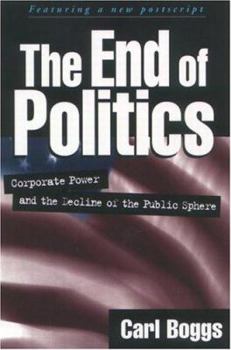The End of Politics: Corporate Power and the Decline of the Public Sphere
Select Format
Select Condition 
Book Overview
This text delves beneath the sound bites and news headlines to explore the ongoing process of depoliticization in the United States. It illustrates how the effects of free-market ideology and... This description may be from another edition of this product.
Format:Hardcover
Language:English
ISBN:1572304960
ISBN13:9781572304963
Release Date:November 1999
Publisher:Guilford Publications
Length:310 Pages
Weight:1.35 lbs.
Dimensions:1.1" x 6.3" x 9.3"
Related Subjects
Americas Business & Finance Economic History Economics Elections & Political Process Government Historical Study & Educational Resources History Political History Political Science Politics & Government Politics & Social Sciences Social History Social Science Social Sciences SociologyCustomer Reviews
2 ratings
A De-politicized Public
Published by Thriftbooks.com User , 24 years ago
The main theme of the End of Politics is that the US despite a history of citizen participation has become a de-politicized culture, especially so over the last two decades, partly as a result of an ever-increasing penetration and transformation of American society by enormous corporations, most noticeably media giants. In lieu of genuine politics the American public is treated to the corporate media's orchestrated political charade that sidesteps serious social issues. The media, as the public relations tool for corporate America, devalues politics and panders to an historical anti-statism by its incessant focus on scandal, corruption, and bureaucratic ineffectualness. While big government is critiqued, the impact of big, trans-national corporations on society never makes it to the table for discussion.I contend that the author overstates the ideological commitment to democracy in the past among the general citizenry. He acknowledges that the liberal-capitalistic order has always operated on the principles of free markets and individualism and minimal governmental interference in the economy. The challenge of the Knights of Labor, the Populists, and the Socialists was the last time that the working class in America acted politically against the economic order. The fact that urban-based political machines in the mid-twentieth century were able to orchestrate get-out-the vote efforts among urban ethnics and union members over bread and butter issues is not evidence of great political insight. Many of those voters and their children are now suburbanites and quite content with their privatized lifestyles of television viewing and mega-mall shopping, a situation that the corporate order is only too happy to exploit.The author devotes considerable space to examining various localized organizations or orientations such as environmentalism, new-ageism, therapeutic fads, rural militias, and postmodern intellectualism for their relevance to political activism. He concludes that the withdrawal from the general public sphere, an enclave mentality, or the reliance on the transforming power of new consciousness give hegemonic elites even more space in which to operate.Though I rate the book at five stars, it is at times tedious and repetitious but it does add to the debate concerning the viability of politics in the US. The author, while focusing on the depoliticization of the culture, finds some hope in the inherent contradictions of capitalist-liberalism. The political charade that is foisted on the American public does contain the pretense of participation that could grow in ways that would be distressing to hegemonic elites.
Corporate influence on the American political system.
Published by Thriftbooks.com User , 24 years ago
The End Of Politics: Corporate Power And The Decline Of The Public Sphere takes an in-depth examination social and cultural trends over the past twenty years which have resulted in a narrowing public discourse and a diminished ability of ordinary citizens to participate in the democratic process. The End Of Politics persuasively demonstrates how social and economic policies initiated during the Reagan presidency and expanded by subsequent administrations have closed political spaces previously opened by civil rights, feminist, and 1960s "New Left" movements. Author Carl Boggs traces the various ways both the right and the more recent left have helped bring us to the point where fewer Americans today bother to vote than at any time in our political history, that money influences elections more than ever before, and large segments of the population no longer believe that government is capable of improving their lives. The End Of Politics takes particular aim at economic globalization and the way large corporations have been allowed to influence all areas of public life, intensifying people's sense of disempowerment and accelerating the "triumph of antipolitics". The End Of Politics is highly recommended, essential reading for all political science students, political professionals, and anyone with an interest in defending and preserving the American political system of citizen participation in the governance of the country.





